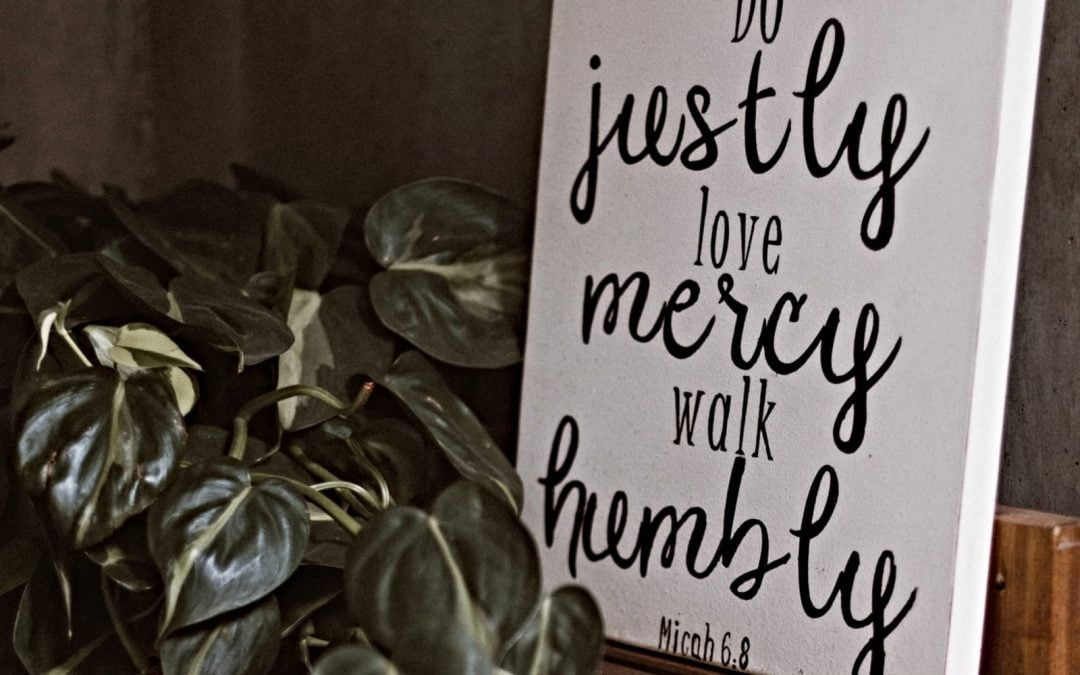Mercy.
A word, concept, attitude, practice so central to the Christian faith, but it has too often been placed on the shelf and forgotten in our interactions with others.
We desire mercy from God for our own shortcomings but we’re less forthcoming when others fail – particularly when they are not part of our “tribe” or when outrage and anger is the popular response.
Recovering mercy as central to our way of life, to our manner of being in relationship with one another, is essential if we want to live up to our calling to be “salt and light.”
Humanity has been guided too often by tribalism, which teaches us to cast a wary eye on “the other” – seeing those with different political, social or religious views as misguided at best and evil personified at worst.
As I read Merianna Harrelson’s “From the Pews” column for November, the word “mercy” came to mind as essential in our work of seeking justice for all and advancing the common good.
“We must resist the urge to give into the hatred, bitterness and violence that is closing in and instead breathe new life into our communities,” Harrelson wrote. “It’s time to turn things around.”
Her “turn things around” reference brought to mind a Dave Matthews Band song from 2012 titled “Mercy.” It voices a prayer, a hope, a challenge, a wondering about the embrace of mercy as the means to create a better world.
“Don’t give up, I know you can see / All the world and the mess that we’re making,” the song opens – observing a verse later that “all the world is just as we’ve made it.”
Acknowledging that we are all complicit in the world’s problems is the first step in charting a new path.
Jesus used the humorous image of sawdust and planks in eyes (Matthew 7:5) to remind us that we must start here, so that our prophetic critique and work for justice is shaped by the acknowledgment of our own shortcomings and the grace-filled hope that all – victim and victimizer, sinner and sinned against – will find healing and redemption.
After an honest facing of reality and our role in shaping it, Matthews observes, “Until we get a new world, I’ve got to say / That love is not a whisper or a weakness / No, love is strong, so we got to get together / … ’Til there is no reason to fight.”
In a world that either sentimentalizes love as gushy emotionalism or sees it as ineffectual in addressing the world’s myriad challenges, the song’s assertions align with Paul’s declaration in 1 Corinthians 13 that love is “the more excellent way” that survives and endures when all else passes away.
While frequently read at weddings, this chapter is Paul’s guidance for a fractured and dysfunctional community of faith, sharing how it can heal its wounds, divides and dis-ease caused by factionalism and libertinism.
So, there is truly no better text for people of faith to live by.
Despite a seemingly ever-growing mercy deficit in our world, I still want to believe that mercy is a force stronger than all of the “principalities and powers” (Ephesians 6:12) that wage war against our collective soul.
I am encouraged and inspired by those who strive to embody the practice of mercy through concrete acts of lovingkindness and generosity of spirit – people like Imad Enchassi, imam of the Islamic Society of Greater Oklahoma City.
A recently released EthicsDaily.com short documentary, titled “Mercy,” shares how mercy has shaped Enchassi’s life – growing up as a refugee in Beirut, surviving the 1982 Sabra and Shatila massacres in which Christian extremists killed thousands of Muslims and ultimately becoming an imam.
“There is only one race – the human race,” Enchassi reflects in an opening segment of the film. “And if grace comes to us, or mercy comes to us, from different people, regardless of the ‘tag,’ that’s awesome.”
Can we show mercy without first considering someone’s “tag”? Perhaps harder, can we receive mercy from them? From a Democrat or Republican? From someone from another faith tradition? From those we encounter regardless of race, ethnicity, gender, sexual orientation, occupation, socioeconomic status, country of origin, immigration status or any category we use to define, divide and differentiate?
Mercy. A word, concept, attitude, practice so central to the best of all religious faith, yet too often set aside as sentimentalism, weakness or a hindrance to “getting things done.”
“Mercy, what will become of us? / One by one, could we turn it around?” Matthews inquires, before suggesting, “Maybe carry on just a little bit longer / And I’ll try to give you what you need.”
Could it be that simple?
Giving and receiving mercy – particularly when it involves those whose “tag” predisposes us to respond negatively, dismissively, even hatefully – is not easy.
But maybe this means that mercy actually can, when faithfully embodied and practiced, make the world a better place.
I believe that – empowered by the spirit of God working in, through and sometimes in spite of us – we can “turn it around” if we “carry on just a little bit longer” in the ways of mercy, of grace, of love.
And what do we have to lose by trying another path given the state of the world?
Let’s give mercy a chance, persisting in its embodiment and embrace even when it is hard, and trusting that it is not whisper or weakness, but the power and wisdom of God.
“So, lift up your eyes, lift up your heart / Singing, Mercy …”


